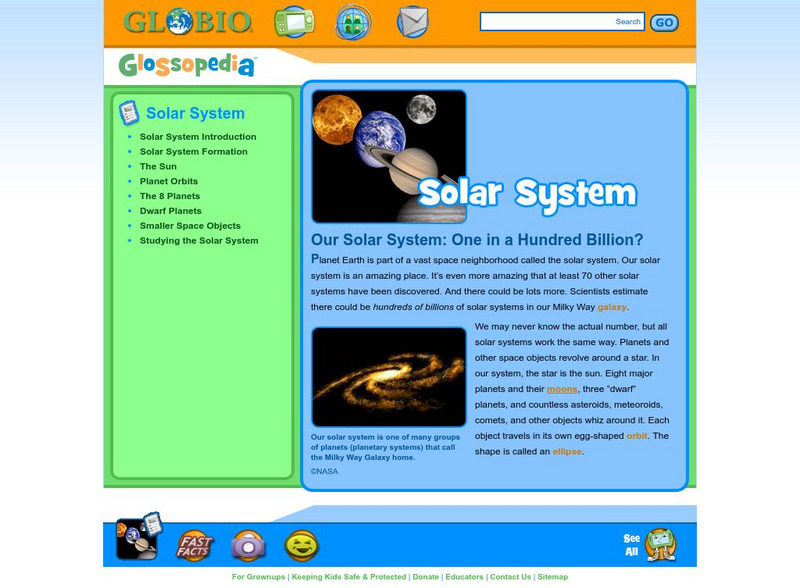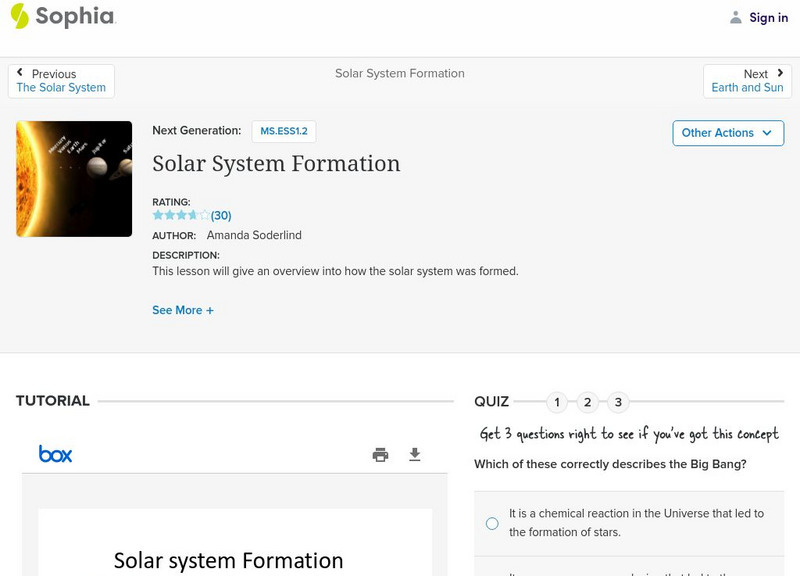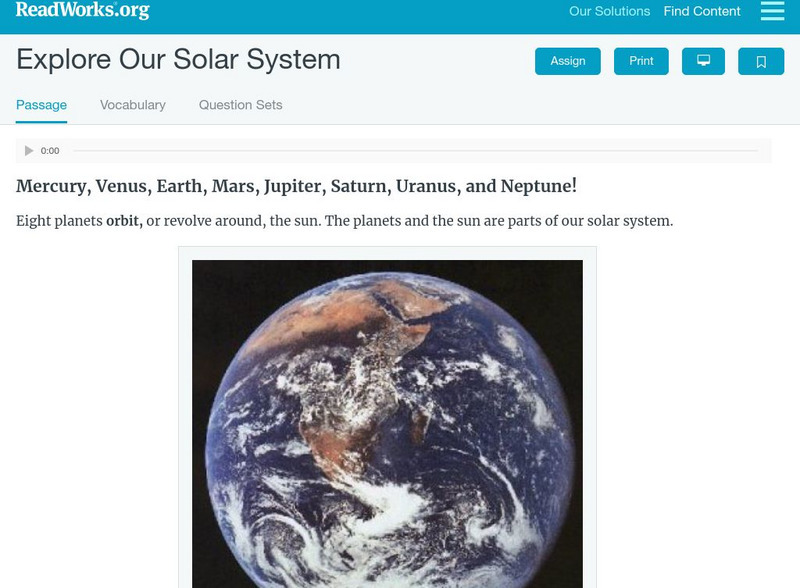Globio
Glossopedia: Solar System
Planet Earth is part of a vast space neighborhood called the solar system. Our solar system is an amazing place. It's even more amazing that many other solar systems have been discovered. This article examines the solar system.
Other
Royal Museums Greenwich: Origin of the Solar System
This site explores current theories about how the Solar System was created.
NASA
Nasa: Night Sky Network: Pocket Solar System
Individual or classroom activity helps students understand the solar system because they can visualize it. Extension resources are included.
NASA
Nasa: Welcome to From Earth to the Solar System (Fettss)
A collection of high-resolution images of space. Images "showcase the discoveries and excitement of planetary exploration, with a focus on the origin and evolution of the Solar System and the search for life".
Khan Academy
Khan Academy: How Our Solar System Formed
An article describing how the sun, planets, moons, and beyond Pluto was formed. Learn more about the beginning of our solar system.
Khan Academy
Khan Academy: Gallery: Earth & Solar System
A gallery of pictures of the cosmic beauty of the Sun, our Solar System, and exoplanets. Pictures include a caption of what the viewer is looking at.
Sophia Learning
Sophia: Solar System Formation
An illustrated slide show highlighting the origin and make-up of our solar system.
CommonLit
Common Lit: Learning About the Solar System
A learning module that begins with "Learning About the Solar System" by Barbara Radner, accompanied by guided reading questions, assessment questions, and discussion questions. The text can be printed as a PDF or assigned online through...
Read Works
Read Works: Explore Our Solar System
[Free Registration/Login Required] This informational text passage shares facts about planets in the solar system. This passage is a stand-alone curricular piece that reinforces essential reading skills and strategies and establishes...
NASA
Nasa: Our Solar System
This thorough look at our solar system has numerous links to a variety of topics that are updated periodically.
Texas Instruments
Texas Instruments: Solar System
This activity is designed to assess the comprehension of concepts related to the planets and other astronomical bodies in the Solar System.
State Energy Conservation Office-Texas
State Energy Conservation Office: Passive Solar Design for Homes [Pdf]
Discusses different features that can be incorporated into a home's design in order to harness solar energy.
State Energy Conservation Office-Texas
State Energy Conservation Office: Solar Water Heaters [Pdf]
Explains the types of solar water heaters a home can have. These include a passive system, an active system, and a solar collector, as well as the need for a storage tank. It also gives tips on how to get the best use from a solar water...
State Energy Conservation Office-Texas
State Energy Conservation Office: Learning About Photovoltaic Systems [Pdf]
Explains how photovoltaic systems work and how Texas homeowners are using them. Discusses how a homeowner can use solar energy and still be on the electricity grid system.
State Energy Conservation Office-Texas
State Energy Conservation Office: Solar Electricity Works for Texas [Pdf]
Discusses photovoltaic energy systems and their many applications, e.g., in telecommunications, consumer products, space technology, solar lights, etc.
California Institute of Technology
Spitzer Science Center: Historias Desde Espacio: Premiacion a Las Planetas
All the planets are competing to see who is the best planet in the Solar System. Read the story in Spanish to learn the results of the pageant. Excellent source of information presented in a fun manner.
NASA
Nasa: Sun: Overview: Our Star
A graphical representation of facts, figures, and information about our solar system's only star, the sun.
Smithsonian Institution
National Air and Space Museum: Exploring the Planets: Mercury
This is a useful resource for facts and images pertaining to the planet Mercury.
Other
Lunar and Planetary Institute: Explore! Ice Worlds
Features a collection of hands-on activities, investigations, and explorations designed to engage students in learning about ice, both in the solar system and on planet Earth.
Smithsonian Institution
National Air and Space Museum: Exploring the Planets: Earth's Lithosphere
The plate tectonics and other features of the Earth's lithosphere are explained and illustrated. Has links to definitions of the magnetosphere, atmosphere, and hydrosphere.
American Institute of Biological Sciences
Action Bioscience: Looking for Life on Mars and Beyond
Learn some of the characteristics of Mars. These characteristics lead some people to believe that life forms may be found on the fourth planet from the Sun.
NASA
Nasa: 21th Century Explorer: Why Do We Want to Study and Travel to Mars?
This article answers some of the most common questions about Mars: Why is it red? Is there water on Mars? What else have scientists discovered from spacecraft that have landed there? Also, visitors can follow links to learn more about...
NASA
Nasa: Students K 4
NASA-sponsored coverage and research on a range of topics related to space exploration -- flying weather stations, comets, first steps on the Moon, and other space-related topics -- are presented in age-appropriate activities, lesson...
NASA
Nasa: Neptune: Overview: The Windiest Planet
Prepared by NASA, this site provides a detailed look at the planet Neptune. The menu tabs are divided into overview, moons, rings, photo gallery, and facts and figures. Just click to access specific information on any of these topics.

















